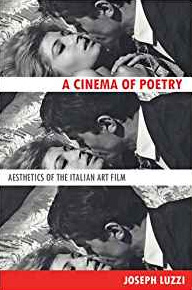A Cinema of Poetry
Aesthetics of the Italian Art Film
A Cinema of Poetry brings Italian film studies into dialogue with fields outside its usual purview by showing how films can contribute to our understanding of aesthetic questions that stretch back to Homer. Joseph Luzzi considers the relation between film and literature, especially the cinematic adaptation of literary sources and, more generally, the fields of rhetoric, media studies, and modern Italian culture.
The book balances theoretical inquiry with close readings of films by the masters of Italian cinema: Roberto Rossellini, Vittorio De Sica, Luchino Visconti, Michelangelo Antonioni, Federico Fellini, Pier Paolo Pasolini, Bernardo Bertolucci, and others. Luzzi’s study is the first to show how Italian filmmakers address such crucial aesthetic issues as the nature of the chorus, the relation between symbol and allegory, the literary prehistory of montage, and the place of poetry in cinematic expression―what Pasolini called the “cinema of poetry.”
While Luzzi establishes how certain qualities of film―its link with technological processes, capacity for mass distribution, synthetic virtues (and vices) as the so-called total art―have reshaped centuries-long debates, A Cinema of Poetry also explores what is specific to the Italian art film and, more broadly, Italian cinematic history. In other words, what makes this version of the art film recognizably “Italian”?
Reviews/Praise
“A thought-provoking and well-written investigation of the role of history and realism in Italian cinema and the role played by the centuries-long tradition of poetry (or more precisely, poesis) in this quest.”
—Emiliano Perra, H-Italy
“Ambitious, inventive, learned, and largely successful, A Cinema of Poetry … brilliantly analyzes the art in the art film by showing how Italian cinema uses a chorus or expresses itself through allegory… This impressively intelligent re-description of the tradition surely takes its place alongside other necessary histories of Italian cinema.”
—Choice
“Luzzi’s inter-art encounters between literary and visual forms reanimate the cinematic texts he discusses. The book is not a reductive reincarnation of national identity or a nostalgic reanimation of the art film. It is a brave undertaking to think toward the future through poetic tropes gleaned from the past ‘as the source for a cinematic rebirth.”
—Journal of Modern Italian Studies
“What makes this particular publication stand out is its focus on inter-art within the discussion of cinema of poetry along with its ability to capture and keep the attention of both specialists and people with a general interest in the subject. Luzzi’s writing style is comfortable to read and the many examples and references, both textual and visual, give a clear demonstration of the ideas and theories which are discussed in the various sections of the book. These positive characterizations of Luzzi’s work will benefit and motivate future research surrounding the combination of inter-art and cinema of poetry, as well as Italian cinema history in general.”
—Italica
“Luzzi brings a set of powerful resources to his new study: a vast erudition, an ear finely attuned to inter-arts allusions, and an ability to discern the workings of poetic tropes within the language of cinema. The result is a deepened understanding of the category of the aesthetic as it relates to Italian film criticism and an affirmation of the riches that this body of canonical films offers to scholars and lay connoisseurs of the seventh art.”
(Millicent Marcus, Yale University)

